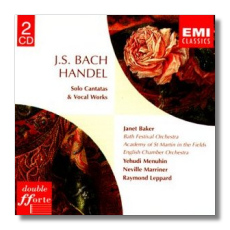
The Internet's Premier Classical Music Source
Related Links
- Latest Reviews
- More Reviews
-
By Composer
-
Collections
DVD & Blu-ray
Books
Concert Reviews
Articles/Interviews
Software
Audio
Search Amazon
Recommended Links
Site News
 CD Review
CD Review
Janet Baker

Sings Bach & Handel
- Johann Sebastian Bach:
- Cantata #82 (Ich habe genug)
- Cantata #169 (Gott soll allein mein Herze haben). Bist du bei mir
- Arias
- George Frideric Handel:
- Ah! crudel nel pianto mio. Armida abbandonata
Janet Baker, mezzo-soprano
Bath Festival Orchestra/Yehudi Menuhin
Academy of St. Martin-in-the-Fields/Neville Marriner
English Chamber Orchestra/Raymond Leppard
EMI Classics 74284 ADD 2CDs 77:44, 77:23
Summary for the Busy Executive: Great singing, variable accompaniments.
Many years ago, when I was a student, a lot of talk went around about the relative merits of Bach and Handel as writers for the voice. The general consensus ran that Handel was "vocal," Bach "instrumental." That is, Handel wrote idiomatically for voice, while singers endured the hell of Bach because the music was so good. I don't take anything away from Handel, but Bach to me, with a few decades of singing experience, gets a bad rap. Sure, it's hard, but it's not really "unvocal." It takes merely a great singer functioning on all vocal and brain-cell cylinders to bring it off. Indeed, one can say the same for Handel. Adequately-sung Handel can be excruciating. Furthermore, the so-called bad habits of Bach's vocal writing occur in Handel's as well: awkward declamation, freakishly wide range, and demand for the greatest vocal flexibility. The bass singer of Bach's Cantata #4 must negotiate a two-octave range – e to e. The same singer must negotiate Messiah's low and dark "The people who walked in darkness" and high and bright "The trumpet shall sound."
Fortunately, singers abound who can leap the hurdles with grace and style: Klaus Mertens, Barbara Schlick, Laura Claycomb, and Patricia Petibone, among others. Indeed, in many ways they show up the older generation of great Bach and Handel singers, like Elly Ameling and Janet Baker, in that they ride the melismas (fast runs of notes on a single syllable) more lightly. But Ameling and Baker put a personal stamp, largely missing from today's singers (Quasthoff's an exception), on whatever they sang. You recognized Janet Baker within a measure. She had not only a voice of silvery, under-the-hill beauty, but musical smarts and an elegant way with a phrase as well - in other words, an ideal choice for Bach.
However, I'd call the results mixed. The excerpts with Marriner and the ASMF suffer mainly because Marriner never gets anything going and gives Baker nothing to play off of, despite gorgeous work from Celia Nicklin on oboe d'amore. The strings sound dull almost to the point of dead, with very little excitement in the musical line. Menuhin in the two complete cantatas with the Bath Festival Orchestra does far better, including excellent playing from an uncredited organist. Baker responds with two stunning performances, even though I have to overcome my resentment that she's snatched a solo cantata (#82) usually taken by baritones and basses. Her aria "Schlummert ein" (a play on words: "fall asleep" or "pass quietly away") won me over - a lullaby that wraps you like a warm blanket. "Death is but a sleep." This is one of Baker's many performances of unearthly loveliness.
On the other hand, the Handel cantatas leave the Menuhin, as good as it is, far behind. Raymond Leppard conducts the English Chamber Orchestra in his own realizations, and all of the sudden the music comes fully alive. Leppard almost always did well with Handel (I put in the "almost" only out of native caution, just in case somehow, at some time, one of his Handels stank and I repressed it). Baker, not ordinarily thought of as a dramatic singer, shows most opera divas how to act with the voice. The emotions are grand but retain their connection to actual people. Indeed, Baker takes the stock figures of stock situations (women abandoned) and gives them dignity and humanity. And she sounds great, besides.
One final carp: no texts. In the case of Handel, the texts are expendable, but not for Bach. Handel's music accomodates people who don't give the text their full attention. The emotions the text portrays are generic, rather than particular. On the other hand, Bach designed his cantatas to "rouse the listeners to piety." They make a theological case. The texts provoke the reader's mind, and you lose a good deal of Bach's drama if you don't know what the words mean. You also lose a good deal of Baker's drama. The cantata "degenerates" into mere beautiful musical phrases. You really do need to know the poetry the music heightens and illustrates, even if you don't agree with the sentiments. So although this is a bargain disc, chintzy, chintzy EMI, and an attitude that betrays lack of respect for its own product. Despite this reservation and the Marriner filler (which nevertheless contains some great moments, if only in Baker's singing), I think a classic disc.
Copyright © 2004, Steve Schwartz


















